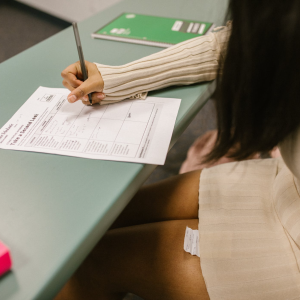A formal test of a person’s knowledge or proficiency in a subject or skill is known as an examination.
An examination is one of the methods of testing, examining, evaluating, and accrediting in the broadest sense. It serves as a guard in decision-making, including but not limited to a choice of personnel to hire for placement, certification, and promotion in schools and other corporate organizations. Examinations could be internal or external, written or oral, and they remain one of the reliable ways of assessment in education.
Poor preparation and desperation to pass an examination are some of the factors that fuel examination malpractice. It is alarming that examination malpractice has taken a new trajectory in our educational system. It is on record that some Professors have lost their jobs to examination malpractice, while others are facing various charges for aiding or executing examination fraud. Even with the harsh consequences of this fraud, students, examiners, etc., continue to deploy new techniques to perpetrate this crime from time to time.
In this piece, we’ll list some of examination malpractice’s disadvantages and consequences or repercussions. Read on!

Definition of Examination Malpractice
Examination malpractice also known as exam malpractice is inappropriate or illegal behaviour/conduct by an examination candidate (examinee) with the explicit aim of achieving a favourable outcome in the examination. It can be seen as any unethical practice carried out before, during or after any examination either by the examinee(s) and/or the examiner(s) sometimes including their relatives to alter the result of an examination in favour of the examinee.
In other words, examination malpractice is any passive or active action taken to compromise an examining body’s original intent and integrity.
Forms of Examination Malpractice
Some forms of examination malpractice are listed below; we did our best to explain some of the exam malpractice slang:
- Leakage of question paper: This can be aided by the examiner, a relative of the examiner, the business center where the question papers were typed, invigilators, etc.
- Impersonation.
- Smuggling of foreign materials (Expo).
- External Assistance.
- Collusion.
- Copying or dubbing.
- Ghost (Special or Miracle) centers: These are known centres, where the centre management encourages high level of examination fraud. Some are centers within the center; that is, they have separate hall for candidates willing to indulge in exam malpractice different from their usual examination hall.
- Intimidation: There are instances where cult members intimidate either the examiner or fellow student(s) in the exam hall or after the examination. They often threaten their fellow student to open their answer booklet for them to copy or threaten to kill or hurt the examiner if they do not give them pass marks in the examination.
- Mass cheating.
- Submission of multiple scripts by students.
- Giraffing: This term is used to describe the act of an examinee stretching his/her neck to peep from another examinee’s work, either with or without the person’s consent.

No “Giraffing”
- Lateral Connection: In this context, lateral connection has to do with the predetermined sitting arrangement of students in the examination hall, where the intelligent student is positioned in such a way that his/her answers can be easily copied by those sitting around him.
- Rank Xeroxing.
- Direct Access (An act whereby an Examiner helps students during an examination).
- Computo: This slang is used to describe a situation where an examiner was paid to key in a different score from what the examinee actually scored during the examination. In some schools, those working in ICT department are mostly connected for this fraud.
- Missile Catch (Answer written on a piece of paper, squeezed and thrown to a student while the examination is going on).
- Swapping of answer booklets between intelligent and poor students.
- E-Cheating (The habit of students engaging ICT devices to indulge in examination malpractices).
- Time Out (The act of going out to the “Toilet” to read up answers).
- Stroke (A situation whereby students pretend to be sick during an examination to gain the Examiner’s sympathy while marking).
- Writing answers/points on tables, chairs, palms and other body parts (e.g. laps). Etc.

Causes of Examination Malpractice
Here are some of the causes of examination malpractice:
- Parents’ Status/Students’ inordinate ambition.
- Teachers’ inadequate coverage of syllabus.
- Societal expectation/orientation.
- Government’s obnoxious policies and poor budget allocation to education.
- Educational institutions’ demand.
- Frequent disruption in the school system orchestrated by frequent striking action by ASUU, NUT, etc
- Employers’ demand: Especially in private educational institutions, where the management insists that staff must assist the students in the exam hall.
- The enabling environment.
- General economic ailment/level of income.
- Congestion in examination halls: e.g. when 400 students use a 100 capacity hall for examination.
- Absence of moral and religious instructions.
- Opened examination hall: This type of hall enables students to jump in and out of the hall quickly upon sighting an invigilator.
- Government’s laxity fuels examination fraud; especially in the area of punishing defaulters.
- Teachers’ threat to fail students: Some teachers are fond of threatening to fail students; this triggers the students’ resolve to pass the exam at all costs, including taking the wrong steps to make it happen.
- Lack of exemplary leadership.etc
Disadvantages of Examination Malpractice
Here are some of the disadvantages of examination malpractice:
- It decreases one’s IQ.
- Gradual loss of memory (Dementia): Memory loss is always associated with academically stunted brain development. Cheating distracts the brain from learning.
- Inferiority Complex: If you are a student who engages in exam malpractice, you may develop a low sense of self-worth and find it difficult to address a large audience confidently.
- It encourages incompetence.
- It encourages irresponsibility.
- It encourages laziness.
- It encourages limitations.
- It encourages low self-esteem.
- It kills the integrity of the institution.
- Low communication skills.
- Manipulation: Aside from engaging in behaviour that falls short of criminality, you are actively destroying the system you rely on to validate your hard work.
- No reflective reading.
- No Regard for Academics: This is very true; students who benefit from exam malpractices might actually see their lecturers as fraudulent individuals because when they were in school the lecturers or teachers paved the way for them to carry out examination malpractice.
- Poor academic performances.
- Poor social life. Etc.
Consequences of Examination Malpractice
Examination malpractice does not encourage students to work hard; this is very true, as candidates/students who would ordinarily be working hard to pass an examination will now depend on fraudulent arrangements.
Examination malpractice can lead to mass failure and cancellation of the entire center results. In some cases, the entire centre might be suspended when it was gathered that mass cheating and examination misconduct was recorded in that particular center.
Malpractice can result in a waste of time, effort, and resources. This is the immediate effect of canceled results due to examination malpractice. The time spent preparing and sitting for the examination, and the efforts and resources are wasted. Another time and money have to be reinvested to resit for the canceled examination.
The consequences of examination malpractice for education and society will be catastrophic in the long run. Since such arrangements rarely fail. Then the fraud or malpractice may eventually be seen as a way of academic exercise.
Also, the candidates produced this way will grow into adults, teachers, or examination officials who will not see anything wrong with such sophisticated and high-class examination fraud. Thus, exam malpractice is a gateway to raising a fraud-minded generation.
Examination malpractice may lure some students into other areas of misconduct, such as prostitution and/or stealing; female students who lack money to fund external assistance or pay for scores may take prostitution, while males may as well take stealing or armed robbery in a bid to make money to pay for scores.
Moreover, exam malpractice renders our certificates worthless in terms of institutional, national and international standards, while hard work is sacrificed on the altar of mediocrity.
In addition, discipline, honesty, dedication, and even the pursuit of self-actualization are pathetically compromised, while talents go unrealized.
It is note worthy that the fine for exam malpractice can be as high as N50,000 or imprisonment for a term not exceeding three years or both such fine and imprisonment and the candidate will not be allowed to re-enter the examination hall or any other place to continue with the examination. In most Universities in Nigeria; punishment for exam malpractice include suspension or rustication. University of Ilorin recently expel nine students over exam malpractice; read the full story on vanguard news.
Also see: Meaning of Awaiting Results and Effects on Admission
Final Thoughts
Examination malpractice refers to dishonest practices that a student or group of students engages in with the intent of passing an examination. This unethical act erodes or weakens the fabric of the examination process.
At its core, examination is a means of gauging one’s level of understanding. Many examinees might or might not grasp this concept. They may feel pressured to cheat on their exams because of how things are. The society should have zero tolerance for academic dishonesty.
Examination malpractice is supposed to be given a holistic approach because it is crystal clear that it is not only students or examinees that engage in this untoward act, but even teachers, lecturers, or examiners, including parents and/or guardians, are sometimes involved in either executing or aiding this corrupt act.
Lastly, examination malpractice is an evil wind blowing nationwide that does no good to anyone. It’s a form of theft that’s corrupting our youth and making them dishonest in every aspect of society. Therefore, we should fight against it.
We hope you find this information helpful. Please use any of the share buttons below to share this information.
Feel free to drop any questions, comments or contributions regarding this article in the comment section below.

1 comment
Malpractice should be abolished because it is more dangerous